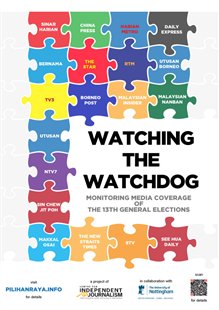
22/05/2013, by CLAS
Malaysia’s General Election Stand-off: Will the revolution be web-streamed?
Malaysia’s general election on 5th May has seen the world’s longest-incumbent elected government claim another term of office, yet appears also to have radically, perhaps permanently, altered the country’s political culture. After the closest and most bitter electoral contest in national history, the victory of the Barisan Nasional coalition, in power since 1957, has been denounced as fraudulent by Anwar Ibrahim, leader of the opposition coalition, Pakatan Rakyat. Pointing to systematic gerrymandering – which grants BN the advantage of tiny, ‘rotten-borough’ parliamentary seats in its rural heartlands – and submitting evidence of grave electoral irregularities in nearly 15% of constituencies, both PR and Bersih 2.0, Malaysia’s independent movement for electoral reform, have refused to recognize the election results, while US President Obama and other world leaders have also voiced concern. Meanwhile, the efforts of BN’s Prime Minister, University of Nottingham graduate Najib Razak, to justify his victory started badly, when his reference to a ‘Chinese tsunami’ propelling PR to its 51% share of the national vote outraged many in this proudly multi-cultural nation, where inter-ethnic tensions are deeply taboo.
Even before electioneering began in earnest, it was clear that the exponential growth on-line both of independent news media agencies, and of social networking sites, was transforming the ways in which ordinary Malaysians perceive, discuss, and participate in their country’s politics. Throughout the electoral campaign itself, this process was part of the focus of the project ‘Watching the Watchdog: Media monitoring the 13th General Election’, run by researchers in the School of Modern Languages and Cultures at the University of Nottingham Malaysia Campus, in collaboration with the Malaysian Centre for Independent Journalism. ‘Watching the Watchdog’ uses new techniques of qualitative discourse analysis to gauge media performance in its treatment of political figures and parties, as well as key policy issues. From April 6th up to polling day, the project’s seventy media monitors, based country-wide, have analyzed the tenor of election commentary, the access to both state and commercial media that is afforded to different political parties, and the language of statements by the campaigners themselves. On-line media outlets – increasingly the chosen forum for news and debate amongst Malaysia’s predominantly young and increasingly urbanized electorate – were a particular focus of the project.
Results of analysis disseminated on the project’s website had a significant impact even during the campaign, widely followed and shared on Facebook and Twitter, and commented on by political pundits, and in radio phone-ins and even cabaret review shows. As well as disclosing the profound pro-government bias in news reportage on state TV and the state news agency Bernama, these results pin-pointed some of Malaysia’s most respected senior statesmen – notably, former premier Dr. Mahatir Mohamad – amongst the individuals with the worst record for negative campaigning: a practice that is deeply disdained in a society that, like most in South-East Asia, prizes respect and diplomacy above candour or freedom of expression.
Given the great store that Malaysians set by tact and harmony, the increasingly rancorous and confrontational tone of post-electoral debate (not to mention some inflammatory racial slurs voiced even by senior political figures) suggests that the country’s young democracy is entering a turbulent new phase. However, while this acrimonious stand-off will test both the organizational strength of the opposition, and the government’s stated commitment to political liberalization and reform, it may also demonstrate how much digital media and social networking sites are contributing to a rising culture of active democratic participation in South-East Asia. The work of ‘Watching the Watchdog’, and hopefully of follow-up projects, makes a crucial contribution to monitoring such developments.
For further information, see
http://www.barisannasional.org.my/en
Mark Sabine, Department of Spanish, Portuguese and Latin American Studies
No comments yet, fill out a comment to be the first

Leave a Reply